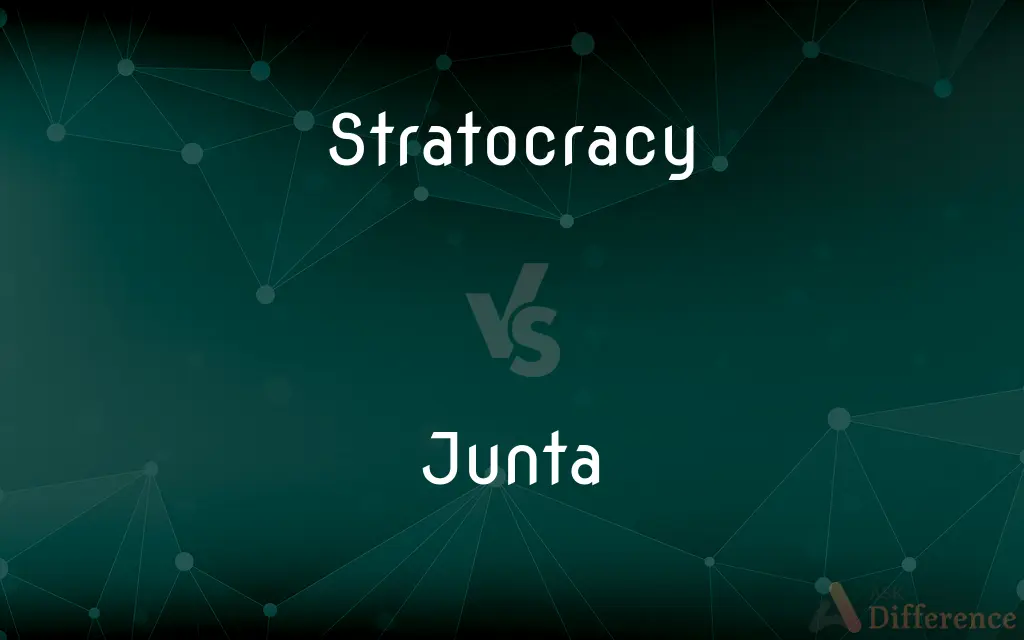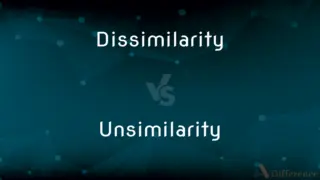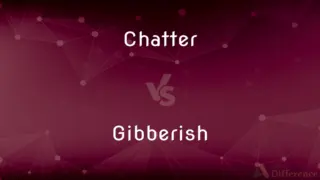Stratocracy vs. Junta — What's the Difference?
By Tayyaba Rehman & Maham Liaqat — Updated on March 20, 2024
Stratocracy is a government led by military officials, whereas a Junta is a rule by a small military or political group.

Difference Between Stratocracy and Junta
Table of Contents
ADVERTISEMENT
Key Differences
Stratocracy refers to a form of governance where military service and government are intertwined, meaning that political power is directly tied to one's military rank and role. On the other hand, a Junta is a form of government that arises when a small group of people, often military officers or a mix of military and civilian leaders, takes control of a country, usually through a coup or a rebellion.
Stratocracies are rare and represent a more structured integration of military principles into the fabric of state governance, aiming for long-term stability and governance through military discipline. Conversely, Juntas typically emerge in moments of political crisis or instability, seeking to fill a power vacuum or address perceived government failures.
While both systems underscore the influence of military or armed forces in governance, a stratocracy institutionalizes this role, making military service a criterion for political power and citizenship. In contrast, a Junta represents a temporary seizure of power by a military or mixed group, with the intention of ruling until a certain objective is met or a transition is possible.
Comparison Chart
Definition
A government form where the state and military are integrated, and leadership is based on military rank.
A government formed by a military or political group seizing power, often temporarily.
Nature
Institutional and structural integration of military into governance.
Temporary, often emerging in crises or transitions.
ADVERTISEMENT
Leadership
Military officers as permanent government officials.
Military or mixed civilian-military leadership, temporarily.
Emergence
Can be a long-standing system, emphasizing military’s central role in state.
Usually arises from coups or crises, with intent to stabilize or transition.
Objective
Maintains state stability and governance through military discipline and principles.
Aims to restore order, address governance failures, or transition power.
Compare with Definitions
Stratocracy
A government system where military officials govern, and state governance is based on military service.
In a stratocracy, promotion within the government depends on one's military rank and contributions.
Junta
May mix military and civilian methods, with decisions often made by a committee.
The junta established a committee to oversee the transition to civilian rule, combining military and civilian experts.
Stratocracy
Emphasizes unity, discipline, and national security.
A stratocracy promotes a culture where military service is esteemed above all other forms of public service.
Junta
Typically seen as a temporary solution, with plans or promises for a return to civilian governance.
Despite its initial promise for a swift return to democracy, the junta extended its rule, citing ongoing instability.
Stratocracy
The military's values and hierarchy deeply influence laws and administrative decisions.
Stratocracies prioritize defense and military discipline in their domestic and foreign policies.
Junta
Emerges during political instability or crisis, aiming to restore order or facilitate a transition.
Juntas often justify their takeover by promising to address corruption or inefficiency in the previous government.
Stratocracy
Tends to have a stable structure, with the military's role institutionalized in governance.
Stratocracies often experience continuity in governance, with military leaders serving as the state's backbone.
Junta
Can be met with resistance or acceptance, depending on the perceived legitimacy and actions taken.
The junta’s reform policies garnered support from some segments of the population, while others organized protests.
Stratocracy
Military service is a requirement for citizenship and political authority.
In stratocratic societies, voting rights and political candidacy often require a history of military service.
Junta
A government formed after a small group, often military, seizes power, typically intending to rule temporarily.
The junta vowed to hold elections after stabilizing the nation’s economic crisis.
Stratocracy
A stratocracy (from στρατός, stratos, "army" and κράτος, kratos, "dominion", "power", also stratiocracy) is a form of government headed by military chiefs. The branches of government are administered by military forces, the government is legal under the laws of the jurisdiction at issue, and is usually carried out by military workers.
Junta
A group of military officers ruling a country after seizing power.
Stratocracy
Government by the armed forces.
Junta
A council or small legislative body in a government, especially in Central or South America.
Stratocracy
A military government.
Junta
The ruling council of a military dictatorship.
Stratocracy
A military government; government by military chiefs and an army.
Junta
A council, convention, tribunal or assembly; especially, the grand council of state in Spain.
Junta
A council; a convention; a tribunal; an assembly; esp., the grand council of state in Spain.
Junta
A junto.
Junta
A small committee or group self-appointed to serve as the government of a country, usually just after a coup d'etat or revolution, and often composed primarily of military men. The term is used mostly in Latin American countries.
Junta
A group of military officers who rule a country after seizing power
Common Curiosities
Can a stratocracy have civilian participation in governance?
While a stratocracy is military-led, civilian roles may exist but are often subordinate to military authority.
What defines a stratocracy?
A government system where military service is directly tied to governance, with military officials often holding governmental authority.
How does a junta come to power?
A junta usually seizes power through a coup or military rebellion during times of instability.
How does a stratocracy affect citizenship?
In a stratocracy, military service is often a prerequisite for full citizenship rights, including voting and holding office.
What is the main goal of a junta?
Juntas aim to restore order, address governance failures, or oversee a transition to stable governance.
How long do juntas typically remain in power?
The duration varies; some aim for quick transitions, while others may hold power longer than initially intended.
What happens to the governance structure under a junta?
Governance under a junta is often centralized and can be a mix of military and civilian, aimed at stabilizing or reforming the government.
Do juntas always involve military leadership?
Most juntas involve military leadership, though some may include civilian members or advisors.
How does international community view stratocracies?
The international reception of stratocracies can vary, often depending on their human rights record and domestic policies.
What is the societal impact of a stratocracy?
Stratocracies promote military values, such as discipline and unity, potentially impacting civilian life and societal norms.
Are stratocracies common?
Stratocracies are rare, as they require a complete integration of military service into the fabric of state governance.
Can juntas lead to stable governance?
While juntas can stabilize a crisis temporarily, their effectiveness in establishing long-term stability varies.
Is there democratic participation in a stratocracy?
Democratic processes in a stratocracy can be limited, with military service often a condition for political engagement.
Share Your Discovery

Previous Comparison
Dissimilarity vs. Unsimilarity
Next Comparison
Chatter vs. GibberishAuthor Spotlight
Written by
Tayyaba RehmanTayyaba Rehman is a distinguished writer, currently serving as a primary contributor to askdifference.com. As a researcher in semantics and etymology, Tayyaba's passion for the complexity of languages and their distinctions has found a perfect home on the platform. Tayyaba delves into the intricacies of language, distinguishing between commonly confused words and phrases, thereby providing clarity for readers worldwide.
Co-written by
Maham Liaqat














































